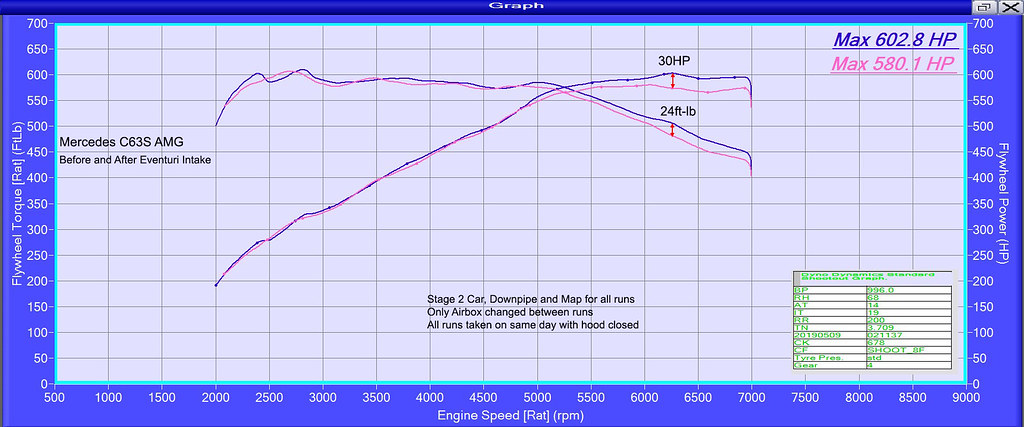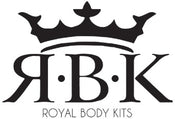Stand out with this incredible Eventuri Carbon Fiber Air Intake for all Mercedes Benz C63 & C63S AMG W205, C205, S205 & A205. Years: 2015 - 2021
Performance Increase – Stage 2 : 22-30hp, 20-24ft-lb
Performance Increase – Stock : 10-12hp, 12-15ft-lb
Flowbench Data : Stock Airbox 381 CFM : Eventuri 531 CFM (Average Per Airbox)
The Mercedes W205 C63S AMG intake system is the culmination of extensive development and testing. Our design brief consisted of 3 main objectives: 1) Increased flow rate. 2) Low intake temperatures. 3) Smooth airflow. The first objective was met by utilising all of the limited space available in the C63S engine bay resulting in a 39% higher flow rate over the stock system. The second objective was met by designing a fully sealed system. The C63S engine bay reaches high temperatures with heat sources like the turbos in close proximity to the intake so it is crucial that the intake remains sealed. The final objective was met by designing an organically shaped system with custom rounded panel filters to ensure the airflow path contained no sharp corners and therefore allowed for the flow to remain laminar. With smooth transitions from the filters to the turbo inlets, our intake minimises the formation of turbulence and therefore the turbos are able to operate more efficiently.
With all 3 objectives met, our W205 C63S intake system delivers on all fronts and allows for the turbos to generate boost more efficiently. This results in an improved throttle response and genuine power gains which increase with higher states of tune. Since there are various turbo upgrades available for the C63S we have also catered a specific solution for larger turbos. Our C63S intake is available in 2 configurations: 61mm ID outlets to match the stock and hybrid turbos and 3″ ID outlets to match larger aftermarket turbos.
Includes:
- 2 x Carbon Fiber Airbox Lids with Turbo Inlet Transitions
- 2 x Carbon Fiber Airbox Bases with Inlet Duct Transitions
- 2 x Carbon Fiber Inlet Ducts
- 2 x Bespoke High Flow Panel Filters
- 4 x CNC Machined Aluminium Filter Flanges
- 2 x CNC Machined MAP Bosses
- 4 x CNC Machined Rubber Mount Holders
- 2 x Custom EPDM Couplers
- Laser Cut Stainless Steel Bracket Work
Dyno Tests
Dyno tests were carried out on both a fully stock C63S and a stage 2 C63S which had downpipes and a remap. Below is the dyno graph for the stage 2 car which had the same tune on all runs and only the airbox was changed. Importantly the hood was closed for all runs to simulate road conditions. Dyno testing with the hood open - especially with open cone style intakes does not give a reliable indication of how the intakes are affecting power. On the road the hood is closed and so all the heat from the turbos is trapped in the engine bay. On the C63S this is intense heat which is why a sealed system is so crucial. Dyno testing an open cone system with the hood open will yield gains but once on the road the heat soak will cause a significant detriment to the power with the open cones sucking in the hot air. With higher air temperature being less dense, the turbos will not make as much boost resulting in lower power. Furthermore, once the car is accelerating and the open cone intakes have pulled through the standing hot air present, they will continue to pull in the heat generated by the engine and turbos as they spool. With the engine under load and accelerating, turbos produce a lot of heat which can even be seen with the hot sides glowing red.
Here it can be seen with our fully sealed system that the power increases linearly after 4800rpm where the airflow demand increases and the stock airboxes become a restriction. These performance gains were measured after only changing the stock airbox for the Eventuri intake - all other modifications were present for both the stock airbox and the Eventuri intake.
The gains measured on the dyno translates on the road to increased part throttle and full throttle response with the car pulling much more eagerly to the redline. The testing was done on the same day back-to-back and temperatures were monitored to ensure consistency. The car was tested firstly with the stock intake - hood closed. We then left the car on the dyno and installed the Eventuri. The car was then run again - hood closed. Several runs were carried out with both configurations to get a consistent result.

Images of products are only for information purposes and can change due to continuous product development. Prices, images and product description are subject to change without notice. Not responsible for typographical errors.
















